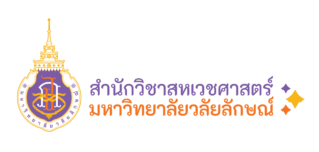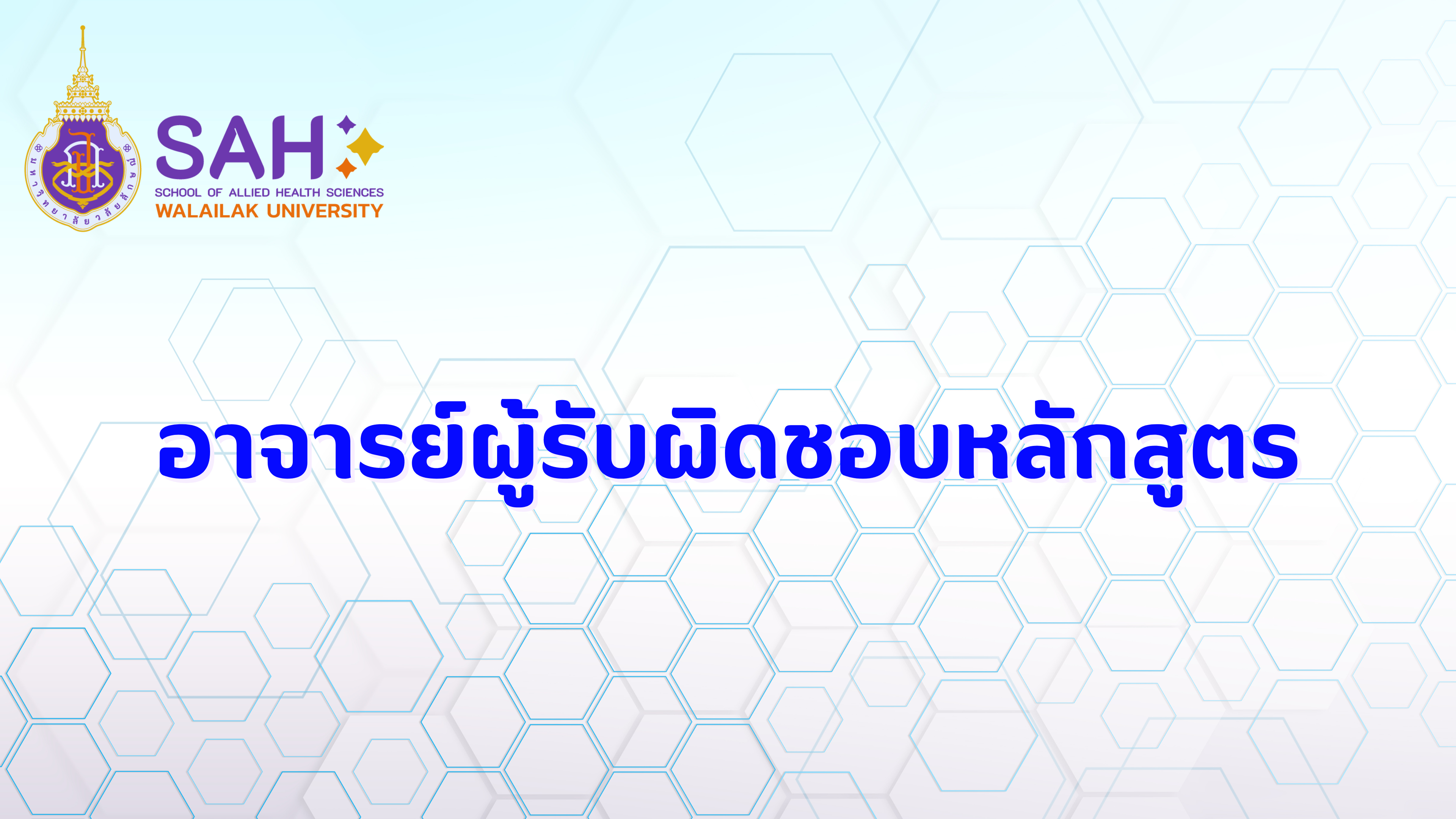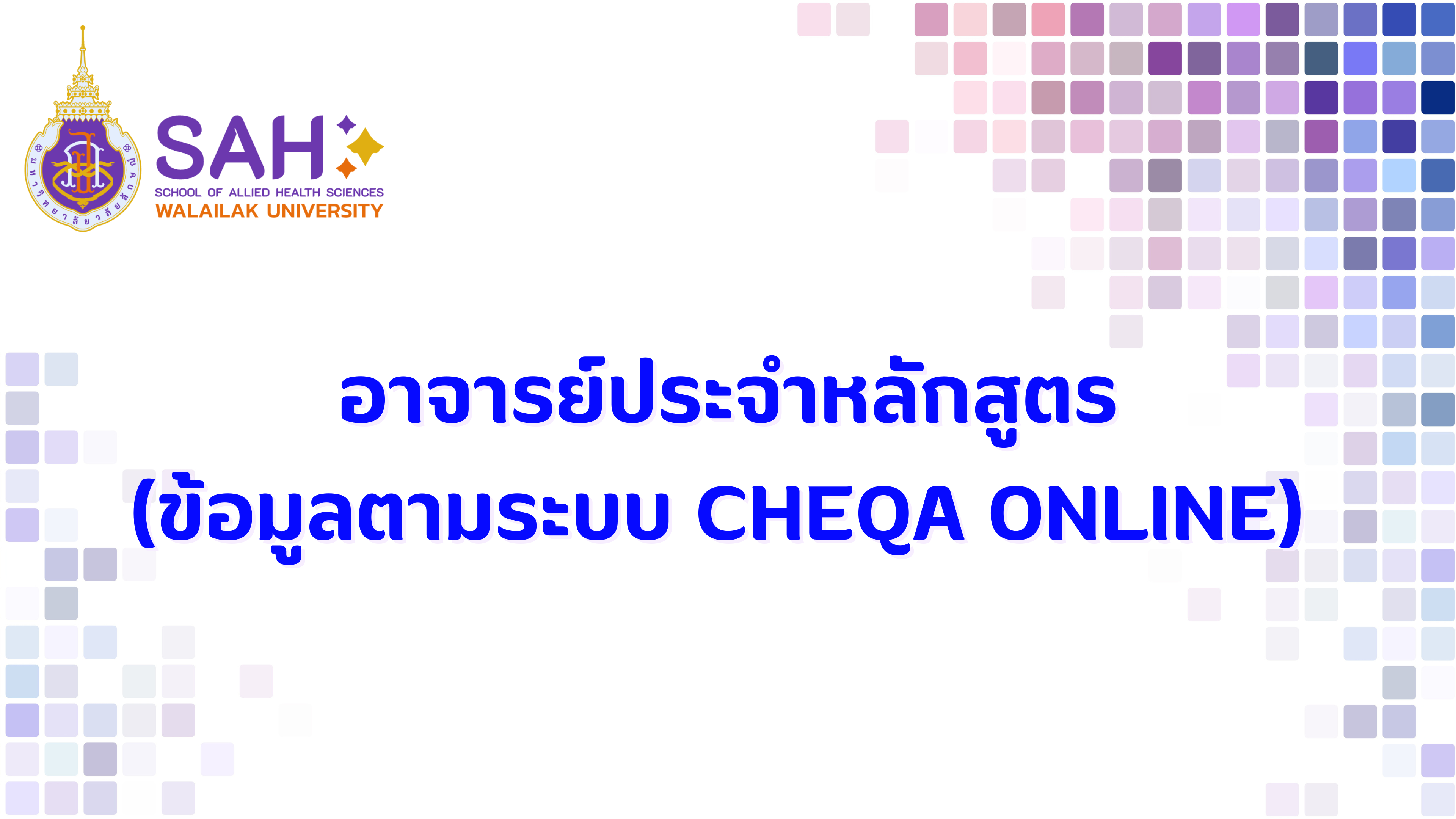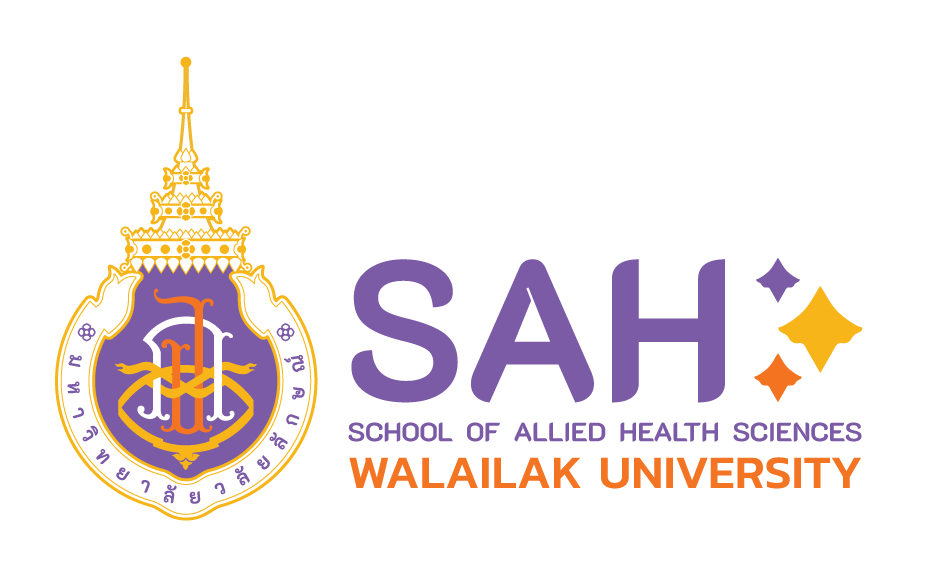
ชื่อหลักสูตร | วิทยาศาสตรมหาบัณฑิต |
ภาษาไทย | สาขานวัตกรรมและเทคโนโลยีทางการแพทย์ หลักสูตรนานาชาติ |
ภาษาอังกฤษ | Master of Science Program in Medical Innovation and Technology (International Program) |
ภาษาไทย
| |
ชื่อเต็ม | วิทยาศาสตรมหาบัณฑิต (นวัตกรรมและเทคโนโลยีทางการแพทย์) |
ชื่อย่อ | วท.ม. (นวัตกรรมและเทคโนโลยีทางการแพทย์) |
ภาษาอังกฤษ | |
ชื่อเต็ม | Master of Science (Medical Innovation and Technology) |
ชื่อย่อ | M.Sc. (Medical Innovation and Technology) |
วันที่อนุมัติหลักสูตร | สภามหาวิทยาลัยอนุมัติ | สป.อว.รับทราบหลักสูตร |
9 เมษายน 2565 | 9 เมษายน 2565 | 19 เมษายน 2566 |
School of Allied Health Sciences, Walailak University
Nowadays, innovation is involved in several disciplines. Broadly, innovation landscapes are characterized by well-established categories, such as product, process, organizational, and marketing innovation, explained and theorized in terms of their links with technological innovation (Mónica Edwards-Schachter, 2018). Medical innovation is one of the most interesting issues and every country attaches great importance to bringing innovation to develop the country for a better quality of life. There are several interesting medical innovations such as artificial intelligence (AI) in healthcare, telemedicine and the evolution of remote care, extended reality in healthcare settings, IoT and wearables in healthcare, organ care technology & bioprinting, non-invasive glucose monitor, gene therapy, genomic testing, anti-bleeding gel, medical applications for smartphones, etc. According to the BCG in Action (Bio-Circular-Green Economy), medical and wellness are included in the BCG model. The goal is to build capacity in drug and biopharmaceutical production, medical devices and implants, and precision medicine and become a hub of healthcare services and clinical research.
Graduate of Master of Science Program in Medical Innovation and Technology is aimed for developing a new state of the art in medical science, bioscience, physical therapy, and biomedical engineering for conducting the medical applications in a wide range of fields such as molecular biology, human genetics, cytogenetics, medical biochemistry, oncology, stem cell technology, biotechnology, nutrition, hematology, immunology, microbiology, and physical therapy, bioinformatics, and medical innovation. Additionally, this course provides the knowledge and concept of medical innovation and entrepreneurship to the students. Both theory and practice are focused on the research in medical science, bioscience, physical therapy, and biomedical engineering for medical applications. Laboratory techniques and research methodology play an important role in enabling the graduates to gain knowledge and skills and to conduct research following academic progress. They are able to integrate effectively modern technology and grounded theory in order to establish a groundbreaking body of knowledge. In addition, the graduates are expected to work efficiently in collaboration with the health science team, acquire considerable interpersonal skills, adopt morality and ethics, and have a responsibility to self and society as well.
The program aims to produce master’s degree graduates of international standards in medical innovation and technology and graduates will gain knowledge, understanding, and skills in applying medical knowledge to the development of innovation and technology. Additionally, this program is aimed to publicize the thesis or a part of the thesis at the international level such as through international publication and encourage the oral presentation at the international conference.
ผลลัพธ์การเรียนรู้ที่คาดหวังของหลักสูตร (Program Learning Outcomes, PLOs)
PLO1 ปฏิบัติตามหลักจรรยาวิชาชีพวิจัยในการดำเนินงานวิจัยทางด้านการแพทย์
PLO1 Follow the research professional ethics in conducting medical research
PLO2 ประยุกต์ทฤษฏี ความรู้และหลักการทดสอบทางด้านวิทยาศาสตร์และเทคโนโลยีทางการแพทย์มาใช้ในการพัฒนานวัตกรรมเพื่อแก้ไขปัญหาด้านสุขภาพของชุมชน สังคม และประเทศชาติ
PLO2 Apply the theory, knowledge, and principles in science and medical technology are used to develop innovations to solve health problems of communities, society, and the national levels
PLO3 ใช้เทคโนโลยีสารสนเทศเพื่อการสืบค้นข้อมูลจากฐานข้อมูลงานวิจัย ฐานข้อมูลทรัพย์สินทางปัญญาหรือฐานข้อมูลที่เกี่ยวข้องกับสถิติทางการแพทย์
PLO3 Use information technology to search for information from research databases, intellectual property databases, or databases related to medical statistics
PLO4 ออกแบบการวิจัย รูปแบบการทดลองตามหลักระเบียบวิธีวิจัยทางการแพทย์ และเลือกใช้เครื่องมือและเทคโนโลยีที่เหมาะสมและทันสมัย
PLO4 Design the research, and experimental model according to medical research methodology, and select appropriate and up-to-date tools and technologies
PLO5 วิเคราะห์ข้อมูลวิจัยโดยใช้หลักสถิติที่ถูกต้องโดยโปรแกรมสำเร็จรูปที่ทันสมัย และสังเคราะห์บทความวิจัยเพื่อการตีพิมพ์เผยแพร่ในวารสารระดับนานาชาติ
PLO5 Analyze research data using accurate statistics by modern software packages and synthesize research articles for publication in international journals
PLO6 นำเสนอทางวิชาการหรือผลงานวิจัยเป็นภาษาอังกฤษสู่สาธารณะในรูปแบบต่าง ๆ โดยใช้เทคโนโลยีสารสนเทศได้อย่างเหมาะสมทั้งในระดับชาติหรือนานาชาติ
PLO6 Present academic works or research results in English to the public in various formats using information technology appropriately, both nationally and internationally
PLO7 สร้างสรรค์ผลงานวิจัยและ/หรือนวัตกรรมทางการแพทย์เพื่อตอบโจทย์ความต้องการทางด้านสุขภาพของสังคมและประเทศชาติ
PLO7 Create research results and/or medical innovations to meet the health needs of society and the nation
PLO8 ทำงานร่วมกับผู้อื่นหรือการทำงานเป็นทีมด้วยความรับผิดชอบ และมีความเป็นผู้นำและผู้ตามได้
PLO8 Working with others or working in a team responsibly and having leadership and follower
PLO9 แสวงหาความรู้และเทคโนโลยีทางการแพทย์ใหม่ ๆ เพื่อการเรียนรู้ตลอดชีวิต
PLO9 Seek new knowledge and medical technology for lifelong learning
8.1 Study Plan
– Semester system (15 weeks/semester): 2 semesters/academic year
1st Semester: August – January
2nd Semester: February – July
– Summer session: N/A
Plan A1 (Total 36 credits): Research Program with seminar (Thesis only)
Year | 1st Semester | 2nd Semester | ||||
1 | MET65-950* | MET Seminar I | MET65-951* | MET Seminar II | ||
MET65-920 | Thesis | 10 credits | MET65-920 | Thesis | 10 credits | |
10 credits | 10 credits | |||||
2 | MET65-920 | Thesis | 10 credits | MET65-920 | Thesis | 6 credits |
10 credits | 6 credits | |||||
* Register for classes without credits (non-credit). Students must have a passing grade (S, Satisfactory)
Plan A2 (Total 36 credits): Course work and thesis
Year | 1st Semester | 2nd Semester | ||||
1 | MET65-600 | Medical Innovation and Technology | 3 credits | MET65-603 | Medical Innovation and Entrepreneurship | 2 credits |
MET65-601 | Cell and Molecular Biology | 4 credits | MET65-951* | Seminar in Medical Innovation and Technology II | ||
MET65-602 | Research Methodology and Medical Biostatistics | 3 credits | MET65-6XX | Elective course 1 | 3 credits | |
MET65-950* | Seminar in Medical Innovation and Technology I | MET65-6XX | Elective course 2 | 3 credits | ||
MET65-921 | Thesis | 3 credits | ||||
10 credits | 11 credits | |||||
2 | MET65-921 | Thesis | 10 credits | MET65-921 | Thesis | 5 credits |
10 credits | 5 credits | |||||
* Register for classes without credits (non-credit). Students must have a passing grade (S, Satisfactory)
Thesis plan
Thesis | Plan A1 (Thesis only) | Plan A2(Thesis and course work) |
Appointment of the advisory committee of thesis and the submission of thesis title | October 2023 | March 2024 |
Proposal defense examination and appointment of proposal defense examination committee for the thesis | December 2023 | May 2024 |
Performing experiments or data collection | January 2024 | June 2024 |
Defense examination and appointment of defense examination committee for the thesis | June 2025 | June 2025 |
Submission of a complete thesis | July 2025 | July 2025 |
Elective courses
MET65-660 | Biomedical Laboratory Techniques | 3 credits |
MET65-661 | Laboratory Animal Science Techniques | 3 credits |
MET65-662 | Genetic Engineering | 3 credits |
MET65-663 | Stem Cell Technology | 3 credits |
MET65-664 | Applied Human Genetics | 3 credits |
MET65-665 | Biosensor Technology | 3 credits |
MET65-666 | Design and Construction of Immunochromatographic Test Kit | 3 credits |
MET65-667 | Natural Product Research | 3 credits |
MET65-668 | Medical Bioinformatics | 3 credits |
MET65-669 | Motor Control and Learning | 3 credits |
MET65-670 | Advanced Exercise Physiology | 3 credits |
MET65-671 | Applied Ergonomics | 3 credits |
MET65-672 | Biomechanics and Human Movement | 3 credits |
8.2 Course Content/ Study Topic
8.2.1 Required courses
MET65-600 | Medical Innovation and Technology | 3 credits |
This course aims to introduce medical innovation and technology including definitions, concepts, relevance theory, the relationship between innovation and technology, and the application and process for the development of medical innovation and technology. To enable students to understand and apply innovation and technology to medical fields. | ||
MET65-601 | Cell and Molecular Biology | 4 credits |
This course aims to provide information on the basic properties of cell and biomolecules, structures and functions of the plasma membrane and cell organelles, cellular energy process and metabolism, structure and expression of genes, control of cell growth and development, cell cycle, cell signaling and communication, cell physiology, cellular immunity, cell death, and basic techniques in cell and molecular biology. Learners learn a basic concept of cell components and biomolecules, understand how these components influence intracellular mechanisms, and have an idea of relevant experimental techniques to study cell and molecular biology. | ||
MET65-602 | Research Methodology and Medical Biostatistics | 3 credits |
This course aims to provide principles and concepts of research; types and research process; research ethics; research problem determination; hypothesis; literature reviews; data collection; analysis and interpretation; paper critique; principle for writing a research proposal; research dissemination; research report evaluation; ethical conduct for research involving human subjects and ethics for researchers. Principle of fundamentals of biostatistics applied for biomedical sciences; descriptive statistics; parameter estimation; hypothesis testing; analysis of variance; analysis of covariance; regression analysis and correlation; nonparametric statistics; statistical analysis programs. | ||
MET65-603 | Medical Innovation and Entrepreneurship | 2 credits |
The course aims to provide an in-depth understanding of health innovation and entrepreneurship, provide the tools needed to assess the attractiveness of new business ideas, and improve students’ critical thinking skills for assessing the elements that influence the success of the health innovation process. | ||
MET65-950* | Seminar in Medical Innovation and Technology I | |
This course aims to review the current research publications in medical innovation and technology; analysis, discussion, conclusion, preparation, and presentation. | ||
MET65-951* | Seminar in Medical Innovation and Technology II | |
This course aims to review current research publications and advanced techniques in medical innovation and technology; analysis, discussion, conclusion, preparation, and presentation. | ||
* Register for classes without credits (non-credit). Students must have a passing grade (S, Satisfactory)
8.2.2 Elective course for plan A2
MET65-660 | Biomedical Laboratory Techniques | 3 credits |
This course aims to understand the theories, principles, techniques, and equipment used in biomedical science research: molecular biology, biochemistry, immunology, microbiology, etc. | ||
MET65-661 | Laboratory Animal Science Techniques | 3 credits |
This course aims to study the animals for scientific purposes act; ethical principles and guidelines for the use of animals for scientific purposes; animal laboratory techniques; genetic and microbial quality; anesthesia and analgesia; feeding technique, blood collection, organ autopsy, and other techniques. | ||
MET65-662 | Genetic Engineering | 3 credits |
This course focuses on theories and principles of recombinant DNA technology including gene selection, gene amplification, and gene expression both in prokaryotes and eukaryotes; site-directed mutagenesis; protein engineering and large-scale protein production; immunoblotting technique; application of molecular genetics in biotechnology; law and ethics in biotechnology. | ||
MET65-663 | Stem Cell Technology | 3 credits |
This course focuses on the biology and characteristics of stem cells; stem cell preparation and its application in therapeutic uses; tissue engineering; global regulatory and ethical issues; commercialization of stem cell therapy; current topics concerning stem cell biology. | ||
MET65-664 | Applied Human Genetics | 3 credits |
This course focuses on analysis, synthesis, and criticism of the research in the application of human genetics to medical innovation and technology development; structure and regulation of the human genome; genetic disorders resulting from genomic structure abnormalities and epigenetics; genetic basis of diseases; the human genome project; personalized gene-targeted therapies and bioinformatics; advanced methods in genetic analysis, single nucleotide polymorphisms (SNPs), microRNA, microarrays, sequencing technology, etc. Students can appropriately apply their knowledge to the human genetics-related thesis. | ||
MET65-665 | Biosensor Technology | 3 credits |
This course aims to study the biosensor technology, components, characteristics, and classification of biosensors; biosensor application, and commercial development. | ||
MET65-666 | Design and Construction of Immunochromatographic Test Kit | 3 credits |
This course aims to provide information on principles and techniques in immunological diagnosis; extraction, synthesis, purification, qualitative and quantitative analysis of protein, components, and optimal condition of immunochromatographic test preparation, commercial kit development, patent, and petty patent. Learners learn the principle and development of an immunochromatography test kit for immunological diagnosis and have an idea of commercial knowledge related to the test kit. | ||
MET65-667 | Natural Product Research | 3 credits |
This course aims to provide medicinal plants and important chemical substances; extraction of medicinal plants; biological evaluation of crude extracts and natural products; development of natural products; safety of consumers; commercial development; Thai and world markets of medicinal plants; Thai government law related to medicinal plant products. | ||
MET65-668 | Medical Bioinformatics | 3 credits |
This course aims to study computational tools in biotechnology; particularly computer software for genome and proteome sequences analysis; a group command in data searching; prediction of primary (1D), secondary (2D), and tertiary (3D) protein structures; molecular docking, etc. | ||
MET65-669 | Motor Control and Learning | 3 credits |
This course aims to study the theories and physiology of motor control; development of functional movements across the life span; control of posture, balance, and functional mobility in normal and movement disorders; motor learning, skill acquisitions, and recovery of functions; clinical application. | ||
MET65-670 | Advanced Exercise Physiology | 3 credits |
This course aims to study the physiological principles of human responses to physical activities and exercises; mechanisms of the regulation of organ systems during exercise; physiological and structural adaptations to exercise training; the impact of changes in the external environment on physical performance and the physiological responses. | ||
MET65-671 | Applied Ergonomics | 3 credits |
This course aims to study the factors in ergonomics for health such as body posture, movement, environmental factors, man and machine interaction, type of activities in tasks and jobs including cognitive and organizational aspects affecting human factors; technology to improve human health and safety, work efficiency and productivity. | ||
MET65-672 | Fundamentals of Biomechanics and Human Movement | 3 credits |
This course aims to study the effects of mechanical phenomena on the human body known as biomechanics. This course will teach students how to apply mechanical principles to human anatomy and function, allowing them to analyze human movement and the musculoskeletal system. The theoretical foundations of quantitative and qualitative methods for measuring movement will also be introduced, allowing for a basic practical analysis of typical movements. | ||
8.2.3 Thesis
MET65-920 | Thesis (Plan A1) | 36 credits |
This course aims to study medical innovation and technology research for plan A1; development of research methodology including research design, developing a thesis proposal, conducting research, data collection, and analysis; manuscript preparation and publication in a peer-reviewed international journal; thesis report and defense under supervision of the thesis advisory committee; moral and research code of conduct. | ||
MET65-921 | Thesis (Plan A2) | 18 credits |
This course aims to study medical innovation and technology research for plan A2; development of research methodology including research design, developing a thesis proposal, conducting research, data collection, and analysis; manuscript preparation and publication in a peer-reviewed international journal or international conference proceeding; thesis report and defense under supervision of the thesis advisory committee; moral and research code of conduct. | ||
9.1. Plan A1
1) Complete one’s full-time studies according to curricula structures, and
2) Experience in an oral presentation (at least one time) in a national or international conference (the virtual conference is also accepted) for presenting the thesis or a part of the thesis, and
3) Complete all required courses and obtain a grading record that satisfies the requirements of the program, and
4) Pass a thesis examination with the result Passed (if Passed with Conditions, the student must revise the thesis until the result shows Passed), and
5) Submit a document that shows the thesis or a part of the thesis is (1) published or (2) accepted for a peer-reviewed international journal (ISI/SCOPUS database).
9.2. Plan A2
1) Complete one’s full-time studies according to curricula structures, and
2) Complete all required courses and obtain a GPAX of at least 3.00 of a total 4.00, and
3) Experience in an oral presentation (at least one time) in a national or international conference (the virtual conference is also accepted) for presenting the thesis or a part of the thesis, and
4) Pass a thesis examination with the result Passed (if Passed with Conditions, the student must revise the thesis until the result shows Passed), and
5) Submit a document that shows the thesis or a part of the thesis is (1) published or (2) accepted for a peer-reviewed international journal (ISI/SCOPUS database) or international conference proceeding.
10.1 Plan A1
1) English proficiency test results meet the criteria TOEFL (Paper-based) 450 or equivalents (such as TOEFL computer-based 153/TOEFL internet-based 45/IELTS academic module 5/CEFR level B1), and
2) Holding a Bachelor of Science or Health Sciences or Biomedical Engineering Program with a cumulative GPA not less than 3.50 or its equivalent in other disciplines considered by The Graduate Program Committee of Medical Innovation and Technology, and
3) Meet specific requirements set by The Graduate Program Committee of Medical Innovation and Technology.
All applicants will be further evaluated for concept proposal presentation and scientific interview by the interview committee appointed by The Graduate Program Committee of Medical Innovation and Technology.
10.2 Plan A2
1) English proficiency test results meet the criteria TOEFL (Paper-based) 450 or equivalents (such as TOEFL computer-based 153/TOEFL internet-based 45/IELTS academic module 5/CEFR level B1), and
2) Holding a Bachelor of Science or Health Sciences or Engineering Program with a cumulative GPA not less than 3.25 or its equivalent in other disciplines considered by The Graduate Program Committee of Medical Innovation and Technology, and
3) Meet specific requirements set by The Graduate Program Committee of Medical Innovation and Technology.
All applicants will be further evaluated for concept proposal presentation and scientific interview by the interview committee appointed by The Graduate Program Committee of Medical Innovation and Technology.
1) The academic qualifications/transcript (certified copy of degree certified in the English version)
2) Applicants from a country where English is not the first language must enclose English proficiency test results. The result must not be more than two years. The applicants should have an English proficiency score of TOEFL Paper-based: 550 or equivalent.
3) Prepare a concept proposal or statement of purpose essay on your proposed thesis topic (not more than 500 words).
4) A copy of your passport
5) Curriculum vitae (CV)
6) Recommendation Letter
Program Chairperson (Medical Innovation and Technology)
Asst. Prof. Dr. Manit Nuinoon, FHEA
School of Allied Health Sciences, Walailak University
Tel: +66-7567-2671, Fax: +66-7567-2601
E-mail: manit.nu@mail.wu.ac.th, manit.nu@wu.ac.th
ยอดผู้เข้าชม : 613




